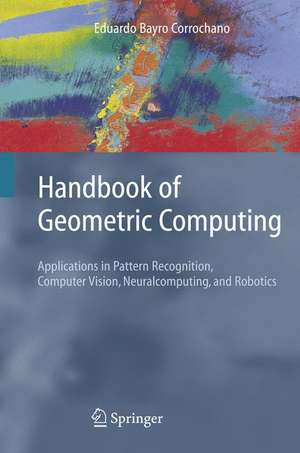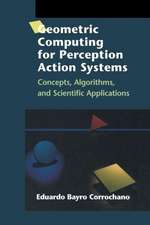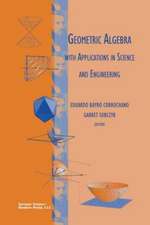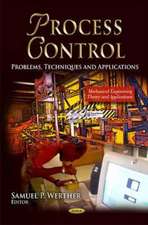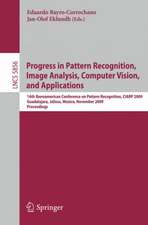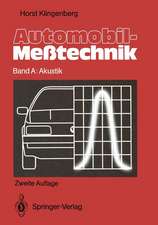Handbook of Geometric Computing: Applications in Pattern Recognition, Computer Vision, Neuralcomputing, and Robotics
Editat de Eduardo Bayro Corrochanoen Limba Engleză Hardback – 7 iul 2005
This handbook is highly recommended for postgraduate students and researchers working on applications such as automated learning; geometric and fuzzy reasoning; human-like artificial vision; tele-operation; space maneuvering; haptics; rescue robots; man-machine interfaces; tele-immersion; computer- and robotics-aided neurosurgery or orthopedics; the assembly and design of humanoids; and systems for metalevel reasoning.
| Toate formatele și edițiile | Preț | Express |
|---|---|---|
| Paperback (1) | 1296.18 lei 6-8 săpt. | |
| Springer Berlin, Heidelberg – 13 oct 2010 | 1296.18 lei 6-8 săpt. | |
| Hardback (1) | 1301.31 lei 6-8 săpt. | |
| Springer Berlin, Heidelberg – 7 iul 2005 | 1301.31 lei 6-8 săpt. |
Preț: 1301.31 lei
Preț vechi: 1626.64 lei
-20% Nou
Puncte Express: 1952
Preț estimativ în valută:
249.03€ • 258.42$ • 208.15£
249.03€ • 258.42$ • 208.15£
Carte tipărită la comandă
Livrare economică 15-29 martie
Preluare comenzi: 021 569.72.76
Specificații
ISBN-13: 9783540205951
ISBN-10: 3540205950
Pagini: 796
Ilustrații: XV, 779 p.
Dimensiuni: 155 x 235 x 48 mm
Greutate: 1.23 kg
Ediția:2005
Editura: Springer Berlin, Heidelberg
Colecția Springer
Locul publicării:Berlin, Heidelberg, Germany
ISBN-10: 3540205950
Pagini: 796
Ilustrații: XV, 779 p.
Dimensiuni: 155 x 235 x 48 mm
Greutate: 1.23 kg
Ediția:2005
Editura: Springer Berlin, Heidelberg
Colecția Springer
Locul publicării:Berlin, Heidelberg, Germany
Public țintă
ResearchCuprins
Neuroscience.- Spatiotemporal Dynamics of Visual Perception Across Neural Maps and Pathways.- Symmetry, Features, and Information.- Neural Networks.- Geometric Approach to Multilayer Perceptrons.- A Lattice Algebraic Approach to Neural Computation.- Eigenproblems in Pattern Recognition.- Image Processing.- Geometric Framework for Image Processing.- Geometric Filters, Diffusion Flows, and Kernels in Image Processing.- Chaos-Based Image Encryption.- Computer Vision.- One-Dimensional Retinae Vision.- Three-Dimensional Geometric Computer Vision.- Dynamic % MathType!MTEF!2!1!+- % feaafiart1ev1aaatCvAUfeBSjuyZL2yd9gzLbvyNv2CaerbuLwBLn % hiov2DGi1BTfMBaeXafv3ySLgzGmvETj2BSbqefm0B1jxALjhiov2D % aebbnrfifHhDYfgasaacH8srps0lbbf9q8WrFfeuY-Hhbbf9v8qqaq % Fr0xc9pk0xbba9q8WqFfea0-yr0RYxir-Jbba9q8aq0-yq-He9q8qq % Q8frFve9Fve9Ff0dmeaabaqaciGacaGaaeqabaWaaeaaeaaakeaatu % uDJXwAK1uy0HwmaeHbfv3ySLgzG0uy0Hgip5wzaGqbaiab-9q8qnaa % CaaaleqabaWexLMBb50ujbqehq0BYngALnhDLjhitnMCPbhDG0evaG % GbaKqzafGae4NBa4gaaaaa!4FF9! $$\mathcal{P}^n $$ to % MathType!MTEF!2!1!+- % feaafiart1ev1aaatCvAUfeBSjuyZL2yd9gzLbvyNv2CaerbuLwBLn % hiov2DGi1BTfMBaeXafv3ySLgzGmvETj2BSbqefm0B1jxALjhiov2D % aebbnrfifHhDYfgasaacH8srps0lbbf9q8WrFfeuY-Hhbbf9v8qqaq % Fr0xc9pk0xbba9q8WqFfea0-yr0RYxir-Jbba9q8aq0-yq-He9q8qq % Q8frFve9Fve9Ff0dmeaabaqaciGacaGaaeqabaWaaeaaeaaakeaatu % uDJXwAK1uy0HwmaeHbfv3ySLgzG0uy0Hgip5wzaGqbaiab-9q8qnaa % CaaaleqabaWexLMBb50ujbqehq0BYngALnhDLjhitnMCPbhDG0evaG % GbaKqzafGae4NBa4gaaaaa!4FF9! $$\mathcal{P}^n $$ Alignment.- Detecting Independent 3D Movement.- Perception and Action.- Robot Perception and Action Using Conformal Geometric Algebra.- Uncertainty in Geometric Computations.- Uncertainty Modeling and Geometric Inference.- Uncertainty and Projective Geometry.- The Tensor Voting Framework.- Computer Graphics and Visualization.- Methods for Nonrigid Image Registration.- The Design of Implicit Functions for Computer Graphics.- Geometry and Robotics.- Grassmann-Cayley Algebra and Robotics Applications.- Clifford Algebra and Robot Dynamics.- Geometric Methods for Multirobot Optimal Motion Planning.- Reaching and Motion Planning.- The Computation of Reachable Surfaces for a Specified Set of Spatial Displacements.- Planning Collision-Free Paths Using Probabilistic Roadmaps.
Recenzii
From the reviews:
"The Editor … has brought together some of the current up-to-date applications of geometric computing with the aim of assisting those who are constructing such systems. This includes not only researchers but also postgraduate students and assistants who are involved in developing and studying such systems. … a comprehensive list of the applications that would benefit from the contributions in this text which have been prepared by some of the leaders in fields that range from neuroscience and neural networks to medical imagery and robotics." (W. R. Howard, Kybenetes, Vol. 35 (5), 2006)
"The Editor … has brought together some of the current up-to-date applications of geometric computing with the aim of assisting those who are constructing such systems. This includes not only researchers but also postgraduate students and assistants who are involved in developing and studying such systems. … a comprehensive list of the applications that would benefit from the contributions in this text which have been prepared by some of the leaders in fields that range from neuroscience and neural networks to medical imagery and robotics." (W. R. Howard, Kybenetes, Vol. 35 (5), 2006)
Notă biografică
Researcher in geometric computing for cognitive systems
Full Professor at the Computer Science Department of the
Center of Research and Advanced Studies CINVESTAV, Guadalajara, Mexico
Author and editor of books on geometric computing for computer science and engineering, reviewer, chair and active organiser of workshops and conferences on geometric computing for fields related to the design and building of perception action systems. Areas of research interest: pattern recognition, computer vision, neurocomputing, robotics, multidimensional image analysis, applications of Lie algebras and Clifford geometric algebra to cognitive systems.
Full Professor at the Computer Science Department of the
Center of Research and Advanced Studies CINVESTAV, Guadalajara, Mexico
Author and editor of books on geometric computing for computer science and engineering, reviewer, chair and active organiser of workshops and conferences on geometric computing for fields related to the design and building of perception action systems. Areas of research interest: pattern recognition, computer vision, neurocomputing, robotics, multidimensional image analysis, applications of Lie algebras and Clifford geometric algebra to cognitive systems.
Caracteristici
Consulting textbook for graduate courses and for researchers seeking powerful geometric methods Great use for specialists working in a particular field or for those who are interested in procedures for dealing with concurrent techniques of different fields like in the design of perception action systems Emphasizes the modern ways and formalisms for the representation and processing of geometric entities and the numerical solutions of equations involving geometric constraints often derived from the problem context The knowledge of all application domains is not required, only very basic notions on geometry The mathematical background will be presented at the beginning of each chapter Includes supplementary material: sn.pub/extras
